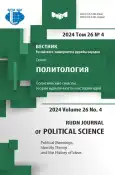Positive Development of Identities in the Context of Change
- Authors: Turkin I.A.1
-
Affiliations:
- RUDN University
- Issue: Vol 26, No 4 (2024): Political Meanings, Identity Theory and the History of Ideas
- Pages: 807-818
- Section: IDENTITY AND SOCIO-POLITICAL DIVISIONS
- URL: https://journal-vniispk.ru/2313-1438/article/view/322409
- DOI: https://doi.org/10.22363/2313-1438-2024-26-4-807-818
- EDN: https://elibrary.ru/UYWJWP
- ID: 322409
Cite item
Full Text
Abstract
The classical theory of cleavages can no longer be used correctly to analyze current politics. At the same time, the tendencies of identity transformation, the emergence of new actors and increasing conflicts between groups are only growing. In this regard, the need for a preventive identification of possible cleavages that may have ontological status in relation to actors is actualized. In the article, the author identifies two trends that have a structural character in current politics: the narrowing of the public sphere and the securitization of memory. Based on these two trends, two potential cleavages are identified: «elites/non-elites» and the cleavage along the lines of historical memory. The first cleavage is based on unaccounted requirements for the political system. The second cleavage is based on the increased transformation of identities and helps new political groups to answer questions about their past, their future and their political present. Bridging the first cleavage involves breaking down the dichotomous division of society into elite and nonelite through the search for unifying values and the expansion of the public sphere. Overcoming the second cleavage includes the creation of memory projects that form a common memorial landscape based on the value unity of society. It is concluded that for the constructive development of identities in Russia it is necessary to create positive projects of the common good with a focus on the development of the state.
About the authors
Ilya A. Turkin
RUDN University
Author for correspondence.
Email: Ilya.turkin2001@gmail.com
ORCID iD: 0009-0006-9485-1659
research intern, Department of Comparative Politics
Moscow, Russian FederationReferences
- Anikin, D.A. (2024). Discourse of historical justice: Ethical-political foundations and conceptual contradictions. Antinomies, 24(3), 55–69. (In Russian). https://doi. org/10.17506/26867206_2024_24_3_55.
- Anikin, D.A. (2024). From the politics of regret to cancel culture: The transformation of historical oblivion in the context of the mediatization of the past. Tomsk State University Journal of Philosophy, Sociology and Political Science, (80), 74–85. (In Russian). https://doi. org/10.17223/1998863Х/80/7.
- Aseev, A.D., & Shishkov, V.V. (2020). Russia in the wars of memory: Historical politics in Eastern Europe. Vestnik of Moscow State Linguistic University. Social Sciences, 2(839), 9–23. (In Russian).
- Baysha, O.A. (2021). Discursive fracture of the social field: The lessons of the Euromaidan. Moscow: HSE Publishing House. (In Russian) https://doi. org/10.17323/978-5-7598-2371-1.
- Baysha, O. (2024). On the integral dimension of the Ukrainian Crisis: The illusion of victuality and the virtuality of illusions. Moscow: HSE Publishing House. (In Russian).
- Ilyin, M.V. (2021). Rediscovering cleavages? An evolutionary interpretation of Rokkan-Lipset cleavages and other cleavages. INION RAN. (In Russian). Retrieved 03 September, 2024, from: https://inion.ru/ru/about/news/iliin-pereotkrytie-razmezhevanii-evoliutsionnaia-traktovka-klivazhei-rokkana-lipseta-i-drugikh-razmezhevanii/
- Ilyin, M.V., & Barsukova, A.V. (2019). Stein Rokkan’s conceptual map of Europe. International trends, 4(17), 6–21. (In Russian). https://doi.org/10.17994/it.2019.17.4.59.1
- Laclau, E., & Mouffe, C. (2001). Hegemony and socialist strategy. Towards a radical democratic politics. New York: Verso.
- Laclau, E. (2009). On populist reason. Lomonosov Political Science Journal, (3), 54–68. (In Russian).
- Laclau, E. (2005). On populist reason. N.Y.: Verso.
- Laclau, E. (1996). Why do empty signifiers matter to politics? In Emancipation (s) (pp. 36–46), London — New York, Verso.
- Letnyakov, D.E. (2022). Historical Memory regimes: From hegemonism to agonism. Politics and Society, (1), 45–53. (In Russian). https://doi. org/10.7256/2454-0684.2022.1.37499.
- Lipset, S.M., & Rokkan, S. (1967). Cleavage structures, party systems and voter alignments: An introduction. In S.M. Lipset & S. Rokkan (Eds.), Party systems and voter alignments: Cross-national perspectives (pp. 1–64). New York: Free Press.
- Malinova, O.Yu. (2018). The commemoration in Russia of the centenary of the 1917 Revolution (s): Comparative analysis of rival narratives. Polis. Political Studies, (2), 37–56. (In Russian). https://doi.org/10.17976/jpps/2018.02.04
- Mälksoo, M. (2015). “Memory must be defended”: Beyond the politics of mnemonical security. Security Dialogue, 46(3), 221–237. https://doi.org/10.1177/0967010614552549
- Mchedlova, M.M., & Kazarinova, D.B. (2020). The identity politics: Competition of new theoretical meanings and political strategies. Political science (RU), (4), 13–35. (In Russian). http://doi.org/10.31249/ poln/2020.04.01.
- Minaeva, А.М. (2018). Russian populism: Political reality or future outlook? Bulletin of Perm University. Political Science, (4), 123–133. (In Russian). http://dx.doi.org/10.17072/2218-1067-2017-4-123-133.
- Morozov, V. (2002). Resisting entropy, discarding human rights: Romantic realism and securitization of identity in Russia. Cooperation and Conflict, 37(4), 409–429.
- Morozov, V. (2015). Russia’s postcolonial identity. A subaltern empire in a Eurocentric world. London: Palgrave Macmillan.
- Mouffe, C. (2013). Agonistics: Thinking the world politically. London: Verso.
- Riabova, T.B., & Riabov, O.V. (2013). «Gayropa»: gender dimension of image of Europe in the practices of political mobilization. Woman in Russian Society, (3), 31–40. (In Russian).
- Semenenko, I.S., Lapkin, V.V., & Pantin, V.I. (2021). Social cleavages and political divides in a theoretical perspective: Criteria for assessment and classification. Polis. Political Studies, (5), 56–77. (In Russian). https://doi.org/10.17976/jpps/2021.05.05
- Shestopal, Ye.B., & Seleznyova, A.V. (2018). Socio-cultural threats and risks in contemporary Russia. Sociological Studies, (1), 90–99. (In Russian).
- Shlykova, D.N. (2023). On the problem of socio-political cleavages in modern Russia. RUDN Journal of Political Science, 25(4), 974–985. (In Russian). https://doi.org/10.22363/2313-1438-2023-25-4-974-985
- Turkin, I.A. (2024). Cancel culture as a tool in the struggle of mnemonic security regimes. Antinomies, 24(3), 101–114. (In Russian). https://doi.org/10.1750 6/26867206_2024_24_3_101.
- Yefremenko, D.V. (2022). Memory as casus belli. Russia in Global Affairs, 20(6), 119–141. (In Russian). https://doi.org/10.31278/1810-6439-2022-20-6- 119–141.
Supplementary files









